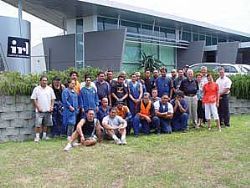OF AWARDS & REWARDS
For business owners who put in the effort to enter business awards around the country the benefits far outweigh any initial perceived minuses. Glenn Baker reports.
When Waverley Klein Ovink decided to enter the David Awards in 2008, little did she realise that, as a direct result, it would lead to her husband Wilco being a guest presenter at the Australian Dairy Innovation conference in Victoria in February 2009. Potentially this opportunity will open the door to the Australian market for The Wrangler Ltd’s lame cow handling product, not surprisingly called ‘The Wrangler’. It’s a breakthrough that simply would not have happened if Waverley had not made the effort to submit an entry. Whakatane-based The Wrangler Ltd won two categories in the David Awards (which are staged entirely online): Marketing, and Innovation. Waverley subsequently sent press releases on their awards success to major rural publications. A professor at the University of Melbourne happened to spot the article in Dairy Exporter magazine and asked Wilco to speak at the prestigious Dairy conference about their innovative product – under the theme of ‘innovative products changing the face of dairying’. Timing nicely with a spot on New Zealand Trade and Enterprise’s “Pathway to Markets” programme, the couple see this as a perfect opportunity to establish the Wrangler brand across the Tasman. “Entering the David Awards, achieving success and having something significant to write about for the farming papers is what it was all about,” says Waverley. “Over a number of years we had become identified as innovative in New Zealand. We already had that kudos, but we’d never been benchmarked, and when the awards judges identified us as innovative, well it gave so much more weight to our reputation.” This story provides a great example of how business awards can benefit businesses in a tangible way. It’s also a good example of how to capitalise on the whole experience. As Waverly puts it, “you need to shout it from the rooftops”. Entering business awards does indeed have its benefits – for The Wrangler Ltd it was opening doors to a new market. But there are many other associated pluses to be considered and the time spent on submitting an entry is well justified by the benefits, according to Terry Hoskins, CEO of Enterprise North Shore. “It’s a chance to realise, recognise and celebrate what your business does well – an opportunity to step back and work ON your business; get an overview of the whole thing so you can see what opportunities you have. It’s also a chance to identify the opportunities and risks you are facing and do something about them before they disappear or escalate. “Good businesses will be asking themselves the same questions as the award criteria requires anyway,” says Hoskins. “So the cost of entering awards should be no more than a cut-and-paste exercise of transferring information from the business plan to the entry form.” John Christie, CEO of the Otago Chamber of Commerce, agrees that the entering process gives owners the chance to look at their business from a new perspective and revisit business strategy. “It gives the opportunity to give their business a personal WOF.” There’s the opportunity to benchmark your business alongside your peers, adds Christie, it also heightens awareness of other businesses or your competitors. Another key benefit, he believes, is that it causes reflection and recognition of staff efforts and the support of your clients and suppliers. Hoskins also offers the following pluses for awards entrants: • It involves stakeholders in the award process and hence the success of your business. • It’s a chance for independent feedback on the business from a highly qualified judging panel. Judges offer independent perspective of strengths and improvement opportunities. • It’s an opportunity for positive media coverage. • It will energise, motivate and build your team. • It will highlight your success to clients, suppliers and your team. • It adds value to strategic and business planning. • It will benchmark your business against your competitors. The impact of the awards process on the people working in the business cannot be understated, as Leeann Watson of the Canterbury Employers’ Chamber of Commerce points out. “We receive a lot of positive feedback from business owners on the value of entering awards. Many have found that simply entering the awards gave their staff a sense of pride in their organisation, and developed a unified team culture. Morale, motivation and enthusiasm levels were also raised.” Watson knows of at least one firm that secured an investor after entering the Champion Canterbury Awards. There has been significant additional business secured through the profile received during and after the awards, and both finalists and winners report a definite increase in visitors to their websites. All entrants are winners You don’t have to be a winner either to achieve good outcomes from awards events. Hoskins uses the example of North Shore IT business RAD9. “They turned from a small, geeky computer company into an effective and efficient marketing machine. They have benefited consistently from being able to display their entrant logo and finalist logo. They have not, not date, won a single category in the Awards and yet have consistently benefited from entering.” A good outcome is also clearly demonstrated in the following feedback from Barry Gillingwater, managing director of DSS Animal Management, the ACC Workplace Safety Category winner in the 2008 Westpac Manukau Business Excellence Awards. “This Award is actually an objective, a destination, and to me it is secondary. The primary value is in the journey – looking at every part of your business, lifting up every rock, seeing what crawls out from underneath and dealing to it, sorting it out. Participation in these awards is the best gift you could ever give your business. It has been a fabulous journey.” And don’t think of business awards as a ‘one-off’ opportunity. The first year Styrobeck Plastics entered the Manukau Business Excellence Awards it came away empty handed – although a finalist in one category. Owner John Beck and his team were disappointed, but took the judges’ feedback on board and spent time improving the presentation of their entry. The second year Styrobeck not only won two categories, it also took away the overall prize as Manukau’s best business. It’s proof that the more you enter, the better your chances of success, if you’re prepared to listen to the experts. Styrobeck experienced an influx of publicity as a result of its wins and a significant increase in recognition by other businesses in the region. Increasing your chances of success There is a perception out there that entering awards is an incredibly complicated and time consuming matter – but it needed be. Certainly there is help available if you’re having difficulty. But how can entrants increase their chances of success? Hoskins says it’s about answering the questions carefully and following the template. “The judges find it much easier to see how good your business is against the competitors if you follow the template and tell them what they need to know in order to award points. Follow the instructions for length and size of entry. If you find it difficult you are probably over complicating things.” Hoskins has seen some common errors made by entrants over the years. “Entrants often provide way too much information – exceeding the length of required entry and making it difficult for the judges to sift through all the detail to find the answers to the specific criteria. Telling the judges all about every aspect of the business doesn’t help them to award points for a specific category and it can be frustrating to trawl through screeds of information to find the bits they need. Succinct entries are far more effective,” he says. Are there too many? While there are those who would argue that there are far too many business awards for the size of the country, and perhaps there is a case for combining some of them – others are equally of the view that there should be more and we need to encourage them. The major business awards around the country seemed to have enjoyed consistent sponsor support – so clearly the profile and recognition gained on that score is more than satisfactory. Certainly, from a small business’s point of view, entry criteria need to be kept fairly simple to encourage entries. Keep the barriers down and a much larger cross section of enterprises will be tempted to have a go. “The various business awards in New Zealand follow several different criteria that are appropriate for each purpose and district,” says Terry Hoskins. “Criteria for the North Shore, for example, have evolved over time and has proven to serve our enterprises and community well. However, we continually look and learn from other criteria and encourage other award organisers to learn from ours as well. “The true value of business awards is their local and bottom up nature. National awards can run rough shod over the needs of local communities and not provide the encouragement, support, recognition and celebration when they get too big in scope, politics and bureaucracy. Enterprises can be put off entering because of the reduced chances of receiving the recognition they deserve from the communities that they serve, and in turn support them.” Local awards with distinctive flavours and application, with local independent judges who love the local enterprise culture, with local sponsors and communities that do the same, always produce motivating, rewarding and effective enterprise promoting events.” Glenn Baker is editor of NZBusiness.





